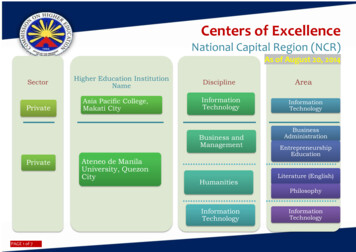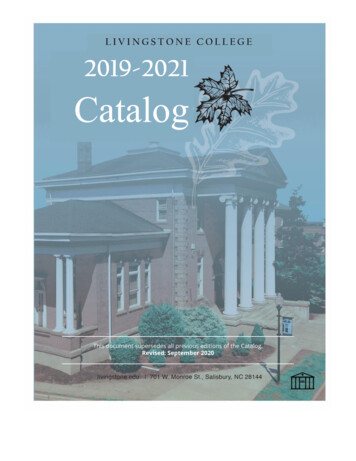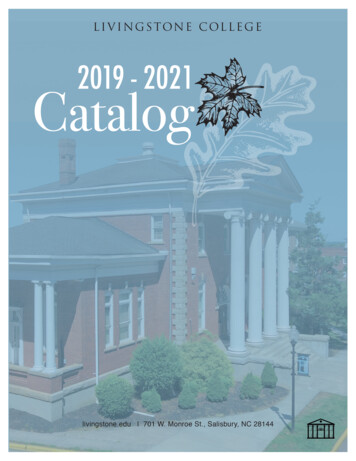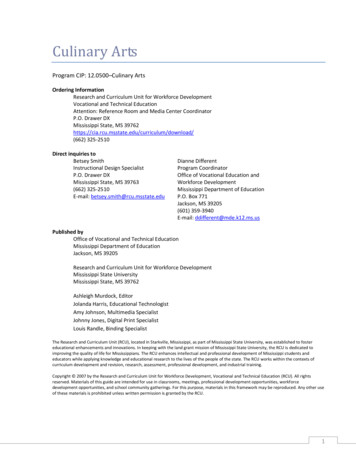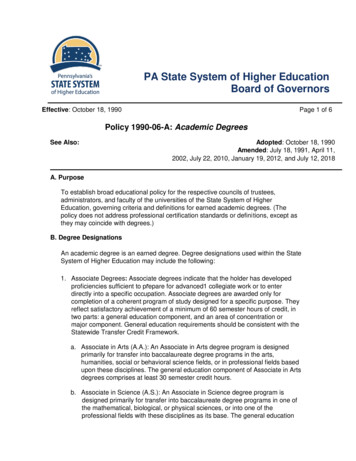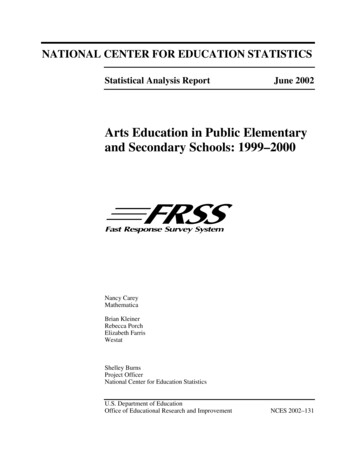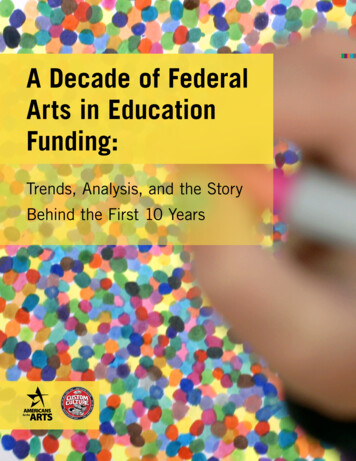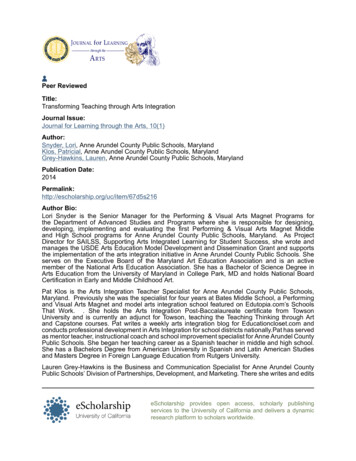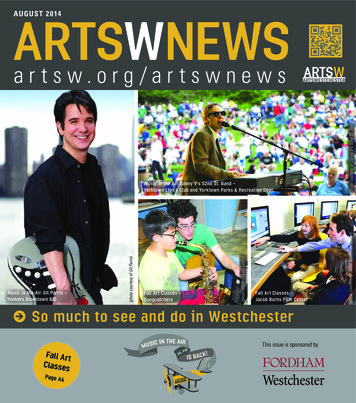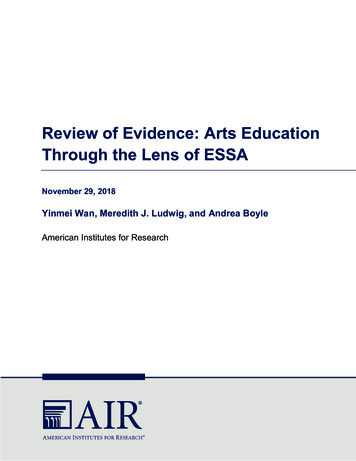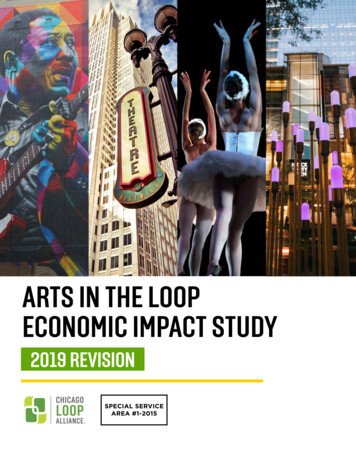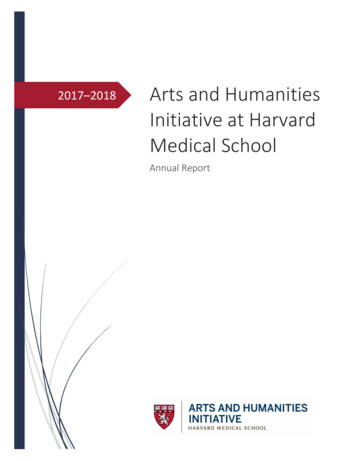
Transcription
2017–2018Arts and HumanitiesInitiative at HarvardMedical SchoolAnnual Report
ContentsAbout the Initiative . 3Mission . 3Goals. 3Leadership . 4Directors . 4Executive Committee . 5Steering Committee . 5Accomplishments . 8Marmor Artist in Residence Program . 8Leslie Jamison . 8Yo-Yo Ma . 11Winter Session for Undergraduates . 19Open Mic Nights in Vanderbilt Hall . 20Musical Events . 21Afternoon of Music and Tea at the Home of Kitty Pechet . 21At the Still Point: Medicine from the Inside . 22The Longwood Chorus . 23Street Symphony String Quartet . 23Music, Conversation & Community . 23Music for Public Health . 24Partnership with Boston Symphony Orchestra . 24Writing. 25Sessions for Medical Students . 25Poetry: The Hippocrates Symposium . 26Community Service. 28Cancer Survivorship Day at Mount Auburn Hospital . 28Retreats . 30A Day of Renewal and Creativity – 2017. 30A Day of Renewal and Creativity – 2018. 31Drawing Sessions . 34Give Yourself a Break . 35Special Events . 36Graphic Medicine . 36Cultivating Humanism . 37Arts and Humanities Initiative at Harvard Medical School 2017-2018 Annual ReportPage 1 of 62
Film Screenings. 39Unrest . 39Medical Drama Pilot "HMS" . 40Readings . 41Autobiography of a Disease . 41Poetry Slam . 42Story Slam . 43ARTZ@Jefferson comes to HMS . 44Conversations on Medicine and the Arts . 45thirdspace Journal . 45Press Coverage . 47In Tune with Students. 47Art, Peace and Health . 49Doctors are taught early about patient histories. Is it time for different questions? . 50. 52A parody of “CAN’T STOP THE FEELING! . 52Publications . 582018 . 582017 . 58The Soul of a Patient: Lessons in Healing for Harvard Medical Students . 59Vision for the Future . 60Acknowledgements . 61Social Media . 61Donation Information . 61Arts and Humanities Initiative at Harvard Medical School 2017-2018 Annual ReportPage 2 of 62
About the InitiativeDespite the vast advances in the biomedical sciences, a leading concern among patients is that their physicians lackcommunication skills and empathy. Arts and humanities as educational tools have the potential to reduce burnout anddepression among health care providers, improve professionalism, reflection and empathy, foster humanism, enhanceperspective, sharpen students’ analytic and diagnostic skills, and improve teamwork and communication to maintain a“culture of safety,” among other goals.We strive to embed the arts into the culture and environment of HMS and its affiliated hospitals thereby enhancing andhumanizing the experience of students, faculty, and patients. We also aim to foster creativity and scholarship in thevarious domains of the medical arts and humanities. We welcome involvement of HMS faculty and students in planningactivities and in every aspect of bringing the arts and humanities into our medical community. We have monthlymeetings and offer a variety of actives, which include writing seminars, open mic sessions, musical gatherings, dance,museum trips, thirdspace (student writing website), and trips to the theatre, retreats, and more.MissionTo foster creativity and scholarship in the arts and medical humanities at HMS and its affiliated hospitals, to promote acommunity of faculty and students interested in the arts and humanities, and to enhance patient care throughreflection and compassion.Goals To develop arts and humanities as disciplines of expression, scholarship, and engagement To serve as a resource for the faculty and student community To establish HMS as a national leader in the Medical Humanities To complement existing bioethics and social medicine programs at HMSArts and Humanities Initiative at Harvard Medical School 2017-2018 Annual ReportPage 3 of 62
LeadershipOur steering committee is multi-disciplinary and multi-institutional. There is representation from many of the HarvardMedical School (HMS) affiliated hospitals, as well as many medical specialties and art forms. Everyone on thecommittee is passionate about bringing the arts and humanities into medical education and practice at HMS. Medicalstudents, residents, and fellows are an integral part of the working committee.DirectorsDavid S. Jones, MD, PhD – DirectorA. Bernard Ackerman Professor of the Culture of Medicine in the Faculty of Arts and Sciences andthe Faculty of Medicine, Harvard UniversityDr. Jones, trained as a psychiatrist and historian of science, is the A. Bernard Ackerman Professorof the Culture of Medicine, he teaches history of medicine and medical ethics at Harvard Collegeand Harvard Medical School. His most recent book, Broken Hearts: The Tangled History of CardiacCare, examines the history of cardiology and cardiac surgery.Lisa Wong, MD – Associate CoDirectorAssistant Clinical Professor ofPediatrics, Massachusetts GeneralHospitalPediatrician, musician and author, Dr.Wong is past president of theLongwood Symphony Orchestra. She has received manyhonors for her work in the arts. Her first book Scales toScalpels: Doctors Who Practice the Healing Arts of Musicand Medicine shows how the musical acumen of thesephysicians affects the way they administer healing and, inturn, how their medical work affects their music.Susan Pories, MD, FACS – Associate CoDirectorAssociate Professor of Surgery, MountAuburn HospitalDr. Pories is the Chief of Breast Surgeryand Medical Director of The HoffmanBreast Center at Mount AuburnHospital in Cambridge, Massachusetts. An author andeditor, her most recent book is The Soul of a Patient:Lessons in Healing for Harvard Medical Students, acompilation of essays by first year medical students.Arts and Humanities Initiative at Harvard Medical School 2017-2018 Annual ReportPage 4 of 62
Executive CommitteeRafael Campo, MD, Associate Professor ofMedicine, Beth Israel Deaconess MedicalCenterDr. Campo teaches and practices generalinternal medical at Harvard Medical Schooland Beth Israel Deaconess Medical Center in Boston. Dr.Campos has received a fellowship, a National PoetrySeries award, and an honorary doctor of literature degreefrom Amherst College. His new book, “Comfort MeasuresOnly,” published by Duke University in 2018.Elizabeth Gaufberg, MD, MPH, AssociateProfessor of Medicine and Psychiatry,Cambridge Health AllianceDr. Gaufberg is the Jean and Harvey PickerDirector of the Arnold P. Gold FoundationResearch Institute. She directs the Cambridge HealthAlliance center for Professional Development and leadsthe reflective practice curriculum for the CambridgeIntegrated Clerkship. Dr. Gaufberg is a founding editor ofthe CHA Literary Arts Journal, Auscultations. Herinnovative curricula on professional boundaries, thestigma of addictions, and the hidden curriculum are in usein hundreds of medical training institutions worldwide.Joel Katz, MD, Associate Professor ofMedicine, Brigham and Women’sHospitalDr. Katz is the Director, InternalMedicine Residency Program andVice Chair for Education,Department of Medicine at BWH where he is theMarshall A. Wolf Chair in Medical Education. Dr. Katzis the director of the Harvard Medical School course“Training the Eye: Improving the Art of PhysicalDiagnosis,” which helps medical students improvetheir skills in physical diagnosis by studying the finearts.Suzanne Koven, MD, MFA, AssistantProfessor of Medicine MassachusettsGeneral HospitalDr. Koven practices primary careinternal medicine at MassachusettsGeneral Hospital in Boston and is theWriter in Residence for the Division of GeneralInternal Medicine at Mass General. Her awardwinning essays, articles, blogs, and reviews haveappeared in many prestigious publications. Dr. Kovenconducts workshops, moderates panel discussions,and speaks to a variety of audiences about literatureand medicine, narrative and storytelling in medicine.Amy Ship, MD, Assistant Professor of Medicine Beth Israel Deaconess Medical CenterDr. Ship is an experienced primary care physician, medical educator, and speaker. She has completedtwo fellowships in medical education and is Faculty at the American Academy on Communication inHealthcare. She facilitates the Literature and Medicine program sponsored by the MassachusettsCouncil for the Humanities at the Brigham and Women’s Hospital and Beth Israel Deaconess MedicalCenter.Steering CommitteeGregory Abel, MD, MFA, AssistantProfessor of Medicine Dana FarberCancer InstituteDr. Abel is a member of theHematologic Malignancies staff,as well as the Center forArts and Humanities Initiative at Harvard Medical School 2017-2018 Annual ReportRonald Arky, MD, Daniel D. Federman,MD, Professor of Medicine and MedicalEducation; Master, Francis Weld PeabodySociety, Harvard Medical SchoolDr. Arky is an endocrinologist atBWH. He has devoted his career toPage 5 of 62
Outcomes and Policy Research. He is a published poetand leads the Literature and Medicine Course atDana-Farber Cancer Institute.mentorship and leadership in Massachusetts andthroughout the nation. He has been a champion ofincorporating the arts and humanities in medicaleducation.Eugene Beresin, MD, Associate Professorof Psychiatry, Massachusetts GeneralHospitalDr. Beresin is executive director ofthe Massachusetts General HospitalClay Center for Young Healthy Minds and director ofthe Harvard Medical School course The DevelopingPhysician. Dr. Beresin has published papers andchapters on a wide variety of topics.Lisa Gruenberg, MD, MFA, AssistantProfessor of Assistant Professor ofObstetrics, Gynecology and ReproductiveBiologyand Reproductive Biology, BostonChildren’s HospitalDr. Gruenberg earned her MFA in creative writingfrom Lesley University. You will find her essayspublished in prestigious journals and her short story,Keiskamma, won the 2012 Massachusetts CulturalCounsel Artist’s Fellowship. Her memoir, "My City ofDreams" is in press.Tommy Heyne, MD, Instructor inMedicine Massachusetts GeneralHospitalDr. Heyne completed a Master’s inTheology and a FulbrightFellowship before medical school. He studies theconceptions of medicine in ancient and medievalChristian and Muslim history. Current academicinterests include the intersection of medicine and thehumanities, including art history and the portrayal ofdisease in artwork.Edward Hundert, MD, Dean for MedicalEducation, the Daniel D. Federman, M.D.Professor in Residence of Global Healthand Social Medicine, and MedicalEducation, Harvard Medical SchoolDr. Hundert has written dozens of articles andchapters on a variety of topics in psychiatry,philosophy, medical ethics, and medical education, aswell as two books. His contributions to the literatureon medical education include writings on the informalcurriculum, curriculum design and management,specific curriculum reform experiences, and definingand assessing professional competence.Martha Katz, MD, Instructor in Medicine,Brigham and Women’s HospitalDr. Katz leads “Reflections onDissection,” held as part of HMS’sintensive introductory “HumanBody” anatomy course. This course allows students tohave the opportunity to utilize metaphors in the artsto deal with the often distressing and conflictingemotions associated with dissecting cadavers.Shahram Khoshbin, MD, AssociateProfessor of Neurology, Brigham andWomen’s HospitalDr. Khoshbin is a Neurologist atthe Brigham and Women’sHospital and the Children’s Hospital. He is one of thecourse directors for “Training the Eye,” a course thatteaches clinical diagnosis to medical students usingprinciples of the visual arts.Arts and Humanities Initiative at Harvard Medical School 2017-2018 Annual ReportPage 6 of 62
Jeremy Nobel, MD, MPH, Instructor onHealth Policy and ManagementDr. Nobel serves on the faculty ofthe Center for Primary Care atHarvard Medical School. He is thefounder and president of the Foundation for Art andHealing, an organization that explores and promotesthe relationship between creative arts expression andthe health and well-being of individuals andcommunity.Robin Schoenthaler, MD, ClinicalInstructor in Radiation Oncology,Massachusetts General HospitalEmerson Hospital.Dr. Schoenthaler is a radiationoncologist at MGH and Emerson Hospital. Her essayshave been published in many prestigious journals.Steven Schlozman, MD, AssistantProfessor of Psychiatry, MassachusettsGeneral HospitalDr. Schlozman is a publishednovelist and short fiction writer. Heteaches psychiatry at Harvard Medical School and filmand creative writing at Harvard University. His firstnovel was the Zombie AutopsiesAndrea Wershof Schwartz, MD, MPH,Instructor in Medicine, Brigham andWomen’s Hospital / Veteran’sAdministrationDr. Wershof Schwartz is a geriatricianand clinician educator with the VA Boston HealthcareSystem and the New England Geriatrics ResearchEducation and Clinical Center. She is a sought-aftermentor and teacher and was presented with the 2018Outstanding Junior Clinician Educator of the YearAward from the American Geriatric Society. She haspublished her original poetry and essays in a numberof leading journals.Arts and Humanities Initiative at Harvard Medical School 2017-2018 Annual ReportPage 7 of 62
AccomplishmentsMarmor Artist in Residence ProgramLeslie JamisonMay 16–17, 2017Report of the Inaugural Marmor Artist in Residence Event at HMS, supported by a gift from Drs. Michael and JaneMarmor, HMS '66.As part of our Marmor Artist in Residence Program, supported by a giftfrom Drs. Michael and Jane Marmor, HMS '66”, Leslie Jamison spent twodays at HMS in 2017, presenting workshops, panel discussions, andlectures. Beginning with her experience as a medical actor who was paidto act out symptoms for medical students to diagnose, Leslie Jamison’svisceral and revealing essays ask essential questions about our basicunderstanding of others: How can we feel another’s pain, especially whenpain can be assumed, distorted, or performed? By confronting pain—realand imagined, her own and others’—Jamison uncovers a personal andcultural urgency to feel. She draws from her own experiences of illness and bodily injury to engage in an explorationthat extends far beyond her life, spanning wide-ranging territory—from poverty tourism to phantom diseases, streetviolence to reality television, illness to incarceration—in its search for a kind of sight shaped by humility and grace.About Leslie JamisonEssayist, New York Times Book Review columnist, and bestselling author of The Empathy ExamsMs. Jamison was born and raised in Los Angeles. She received her undergraduate degree from Harvard, her MFA fromthe Iowa Writer's Workshop, and her PhD in English from Yale. Her first novel, The Gin Closet, was selected a BestBook of 2010 by the San Francisco Chronicle and was a finalist for the Los Angeles Times Art Seidenbaum Award forFirst Fiction. Her essay collection, The Empathy Exams, published in 2014, was a New York Times best seller and wasselected as one of the top ten books of the year by numerous publications, including Publisher’s Weekly,Entertainment Weekly, and O Magazine. Leslie is currently a columnist for the New York Times Book Review and editorof Best American Essays 2017. Her next book, The Recovering, will be published in April 2018. She is on the faculty ofColumbia University and lives with her family in Brooklyn.AgendaTuesday, May 16, 2017 1:00–3:00pm Luncheon and Narrative Master Class for Medical studentsA discussion and writing exercise focusing on what literary narratives in fiction, nonfiction, and poetry can suggestabout the experience of illness or medical care, and the difficulties and possibilities of empathy. 5:00–7:00pm Reading and Lecture, followed by Reception for the HMS CommunityWednesday, May 17, 2017 1:00–3:00pm Lunch and discussion about The Empathy ExamsLeslie Jamison met with students, house staff, and faculty to discuss the process of writing her bestselling essaycollection, The Empathy Exams, as well as narrative medicine and medical journalism in general.Arts and Humanities Initiative at Harvard Medical School 2017-2018 Annual ReportPage 8 of 62
5:00–6:30pm Panel DiscussionWhat Is Empathy, and How Do We Teach It? with Suzanne Koven, MD; Susan Block, MD; Fidencio Saldana, MD; andIvana Viani, MS3 HMS.SummaryLeslie Jamison spent two days at HMS and interacted with over 100 student, faculty, resident, and staff participantsduring that time.On the first day, she conducted an electrifying narrative master class for medical students in which she helped themexplore several illness accounts by writers and poets. That evening she gave a talk and reading, centering on heracclaimed essay "The Empathy Exams," in which she recounts her experiences as a standardized patient helping trainmedical students at the University of Iowa while she was studying at the Iowa Writers Workshop several years ago. Aspirited conversation about the nature of empathy ensued and, even best of all, at the reception afterwards, Ms.Jamison sat for over an hour with students informally continuing the conversation and inscribing copies of her book,which were given as a gift to each student as part of the Marmor program.On the second day of her visit, Ms. Jamison led a luncheon seminar on writing and storytelling to a range of participants:students, residents, researchers, and senior faculty. One participant, Dr. Andrea Wershof Schwartz, a junior facultymember and founding member of our initiative, wrote afterwards, That was amazing! Thank you for bringing Lesliehere. She is incredible and I feel inspired!Dr. Schwartz went straight from the luncheon to teach the HMS Practice of Medicine course small group sessions onempathy. She commented: It came right out of Leslie's first chapter in the Empathy Exams.Thank you again forbringing such a talented artist to HMS and I look forward to building on and learning from our first Marmor artist inresidence experience!The finalevent was apaneldiscussion:"What IsEmpathy andHow Do WeTeach It." Ms.Jamison, DanaFarber Chiefof PalliativeCare, Dr. Susan Block, HMS Dean of Students Dr. Fidencio Saldana, and fourth year HMS student Ivana Viani joinedmoderator Dr. Suzanne Koven and a rapt audience of students, nurses, physicians, and patients to grapple with thedifficult questions posed in the panel's title. As a prelude to the panel, Dr. Lisa Wong and several medical studentsplayed Air by Bach on flute, violin, and viola. The gorgeous music opened our hearts and further expanded ourunderstanding of the power of empathy—and art.Arts and Humanities Initiative at Harvard Medical School 2017-2018 Annual ReportPage 9 of 62
All who attended these events were deeply moved, including Leslie Jamison herself. She commented that herinteractions with our students—so thoughtful and receptive to the idea of bringing the arts into medical training—werethe highlight of her visit.A Sampling of Comments and Feedback Joel Katz, MD, associate professor of medicine at Brigham and Women’s Hospital: I thought that the Tuesdayafternoon session was just fantastic, and I know the students and residents were very moved and inspired. Ms.Jamison was a perfect choice and foundation for future growth. Fidencio Saldana, MD, dean of students: How do you teach empathy? Don't STOP teaching it - not only duringthe preclinical year, but also beyond. We need to keep giving "booster shots" along the way, through clinicalyears and residency. Susan Block, MD, Dana Farber Chief ofPalliative Care: We can only beeffective when we slow down andlisten. We teach skills and discipline,words and responses - which ourtrainees then use to make the music ofcaring for our patients. Suzanne Koven, MD, writer inresidence, Massachusetts GeneralHospital: arts, humanities and healingare inextricable. Art as healing, art as transformation is a necessary part of our medical curriculum. Colleen Farrell, fourth year medical student at Harvard: The Marmor Artist in Resident series with LeslieJamison was such a valuable opportunity for me. By closely reading texts in Leslie’s Master class, my mind wasopened to new ways of thinking of patient narratives. In another discussion with Leslie, she shared her astuteinsights on how to approach my own writing about my experiences in medical school. From the synergisticconversation between Leslie, Dr. Fidencio Saldana, and Dr. Susan Block, I came away with a more nuancedsense of how to approach difficult conversations with patients. It was also a special treat for me to performchamber music before one of the events, and to think about the connections between music and other formsof communication. I am sure that many of the insights I took from these events will stay with me into residencyand beyond.Arts and Humanities Initiative at Harvard Medical School 2017-2018 Annual ReportPage 10 of 62
Yo-Yo MaApril 9–10, 2018Report of the second Marmor Artist in Residence event at HMS, supported by a gift from Drs. Michael and Jane Marmor,HMS ’66.About Yo-Yo MaYo-Yo Ma was born in 1955 to Chinese parents living in Paris. He began to study the cello with his father at age four andthree years later moved with his family to New York City, where he continued his cello studies with Leonard Rose at theJuilliard School. After his conservatory training, he sought out a liberal arts education, graduating from HarvardUniversity with a degree in anthropology in 1976. He has received numerous awards, including the Avery Fisher Prize(1978), the Glenn Gould Prize (1999), the National Medal of the A
the Faculty of Medicine, Harvard University Dr. Jones, trained as a psychiatrist and historian of science, is the A. Bernard Ackerman Professor of the Culture of Medicine, he teaches history of medicine and medical ethics at Harvard College and Harvard Medical School. His most recent boo
